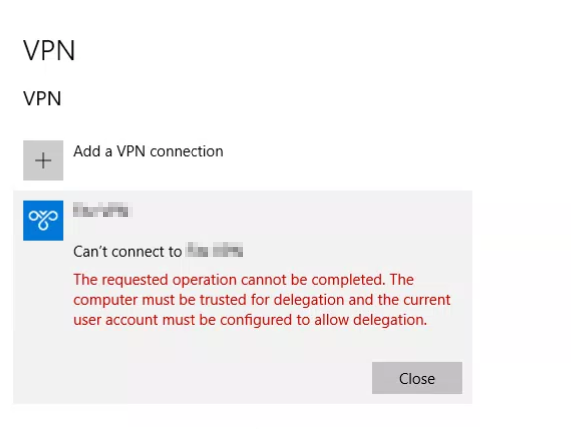If you receive the below error message when attempting to connect to a Routing and Remote Access VPN from a Windows 1- domain-joined computer:

Can’t connect to <VPN Name>
The request operation cannot be completed. The computer must be trusted for delegation and the current user account must be configured to allow delegation.
Settling delegation access on the computer or user account makes no difference.
To resolve this issue create the following registry key on the Windows 10 computer:
HKEY_LOCAL_MACHINE\Software\Microsoft\Cryptography\Protect\df9d8cd0-1501-11d1-8c7a-00c04fc297eb
Alternatively, Right Click, Create new dWord (32 bit) Value, Name ‘Protection Policy’ then edit it to the value of 1. This should solve the issue immediately, no restart required.

You can check your network settings, switch servers, confirm that the appropriate ports are open, disable the firewall, and reinstall your VPN program if it isn’t functioning properly. It’s time to get in touch with your VPN provider if none of the options listed below are successful.
Let’s get into the specifics and talk about how to fix your VPN client. If you use Android or iPhone devices, you can still use our VPN troubleshooting guidelines.
There are numerous potential causes of connectivity problems with your VPN.
Verify that your normal network connection is functioning properly as the initial step in the fundamental troubleshooting process. You can reset TCP/IP, flush DNS, run Windows network troubleshooter, run a Netsh Winsock reset, and other methods to fix Internet connection issues if your network connection has issues.
To see if they can resolve the VPN issues, you can try update or reload your network drivers and upgrade Windows 10 to the most recent version.
You can check the alternatives listed below to resolve the VPN not connecting Windows 10 issue if your regular network connection is functioning properly.
If you’re using a VPN connection, double-check that you’ve entered the correct login and password. If you use a free VPN service, you can then check the website of the VPN service provider to see if the login information has changed, discover the most recent login information, and enter it to attempt connecting again.
There are frequently numerous servers available through a VPN service. You can switch to connect to another VPN server to see if it can connect successfully if the one you are now using isn’t functioning properly or can’t connect due to a traffic overload.
Since VPN software is often updated, if you are using third-party VPN software, you can check for updates to upgrade the VPN software to the most recent version or reinstall it. You can verify whether Windows 10’s VPN not connecting issue has been resolved after updating the VPN program.
Your firewall doesn’t provide the same job as your VPN; instead, they cooperate with one another (as well as your antivirus program) to increase the online security of your company. This is the cybersecurity “barrier” component. A digital firewall is what stands between your device and the wider internet and stops any risks that try to spread through your systems, just as a firewall in a building will stop flames from spreading throughout.
Every packet, or little parcel of data that digital signals are divided into for better management, according to the firewall hypothesis, moving between the inner and outer digital worlds will be intercepted. The firewall will “inspect,” “verify,” or “flag” each packet in the flow after making this interception.
As you’ve read, firewalls and VPNs both improve cybersecurity, but they do it in different ways: on the one hand, by masking activity, and on the other, by serving as a protective barrier. So let’s take a closer look at how these two technologies interact right now. The important thing to note in this situation is that firewalls and VPNs both have inherent limits.
To learn more about our services. Contact Us now!
We offer a sense of partnership that goes beyond the typical IT experience. Our value starts where the scope of a traditional managed service ends.
We’re not just another faceless IT company. We are all about old school professionalism, which means rather than hiding behind our screens, we’d like to meet you face to face (or virtually if required!).
Let’s organise an initial in-person or online meeting to scope if we’d be a good fit for you.
Copyright Ⓒ 2025 Myrtec All Rights Reserved